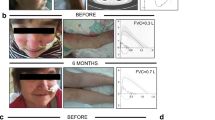Abstract
Here, we describe an adult female with severe fasciitis and skin necrosis who carried a private, predicted deleterious missense mutation in OTULIN in heterozygosity. OTULIN is a cellular regulator of deubiquitination that has been shown to play a key role in intrinsic immunity against staphylococcal α-toxin. The patient was treated with broad-spectrum antibiotics, and multiple surgical explorations were conducted without clinical response. Since autoinflammation was the predominant clinical feature, TNF inhibition was started with a good clinical response. We show that excessive inflammation in OTULIN haploinsufficiency can be effectively treated by TNF inhibition.

Similar content being viewed by others
Data Availability
Additional data generated during and/or analyzed during the current study are available from the corresponding author on reasonable request.
References
Keusekotten K, Elliott PR, Glockner L, Fiil BK, Damgaard RB, Kulathu Y, et al. OTULIN antagonizes LUBAC signaling by specifically hydrolyzing Met1-linked polyubiquitin. Cell. 2013;153(6):1312–26. https://doi.org/10.1016/j.cell.2013.05.014.
Rivkin E, Almeida SM, Ceccarelli DF, Juang YC, MacLean TA, Srikumar T, et al. The linear ubiquitin-specific deubiquitinase gumby regulates angiogenesis. Nature. 2013;498(7454):318–24. https://doi.org/10.1038/nature12296.
Damgaard RB, Walker JA, Marco-Casanova P, Morgan NV, Titheradge HL, Elliott PR, et al. The deubiquitinase OTULIN is an essential negative regulator of inflammation and autoimmunity. Cell. 2016;166(5):1215-30.e20. https://doi.org/10.1016/j.cell.2016.07.019.
Verboom L, Hoste E, van Loo G. OTULIN in NF-κB signaling, cell death, and disease. Trends Immunol. 2021;42(7):590–603. https://doi.org/10.1016/j.it.2021.05.003.
Clague MJ, Urbé S, Komander D. Breaking the chains: deubiquitylating enzyme specificity begets function. Nat Rev Mol Cell Biol. 2019;20(6):338–52. https://doi.org/10.1038/s41580-019-0099-1.
Lork M, Verhelst K, Beyaert R. CYLD, A20 and OTULIN deubiquitinases in NF-κB signaling and cell death: so similar, yet so different. Cell Death Differ. 2017;24(7):1172–83. https://doi.org/10.1038/cdd.2017.46.
Nabavi M, Shahrooei M, Rokni-Zadeh H, Vrancken J, Changi-Ashtiani M, Darabi K, et al. Auto-inflammation in a patient with a novel homozygous OTULIN mutation. J Clin Immunol. 2019;39(2):138–41. https://doi.org/10.1007/s10875-019-00599-3.
Zhou Q, Yu X, Demirkaya E, Deuitch N, Stone D, Tsai WL, et al. Biallelic hypomorphic mutations in a linear deubiquitinase define otulipenia, an early-onset autoinflammatory disease. Proc Natl Acad Sci U S A. 2016;113(36):10127–32. https://doi.org/10.1073/pnas.1612594113.
Spaan AN, Neehus AL, Laplantine E, Staels F, Ogishi M, Seeleuthner Y, et al. Human OTULIN haploinsufficiency impairs cell-intrinsic immunity to staphylococcal α-toxin. Science. 2022;376(6599):eabm6380. https://doi.org/10.1126/science.abm6380.
Arts P, Simons A, AlZahrani MS, Yilmaz E, AlIdrissi E, van Aerde KJ, et al. Exome sequencing in routine diagnostics: a generic test for 254 patients with primary immunodeficiencies. Genome Med. 2019;11(1):38. https://doi.org/10.1186/s13073-019-0649-3.
Bousfiha A, Moundir A, Tangye SG, Picard C, Jeddane L, Al-Herz W, et al. The 2022 update of IUIS phenotypical classification for human inborn errors of immunity. J Clin Immunol. 2022;42(7):1508–20. https://doi.org/10.1007/s10875-022-01352-z.
Ioannidis NM, Rothstein JH, Pejaver V, Middha S, McDonnell SK, Baheti S, et al. REVEL: an ensemble method for predicting the pathogenicity of rare missense variants. Am J Hum Genet. 2016;99(4):877–85. https://doi.org/10.1016/j.ajhg.2016.08.016.
Kircher M, Witten DM, Jain P, O’Roak BJ, Cooper GM, Shendure J. A general framework for estimating the relative pathogenicity of human genetic variants. Nat Genet. 2014;46(3):310–5. https://doi.org/10.1038/ng.2892.
Karczewski KJ, Francioli LC, Tiao G, Cummings BB, Alföldi J, Wang Q, et al. The mutational constraint spectrum quantified from variation in 141,456 humans. Nature. 2020;581(7809):434–43. https://doi.org/10.1038/s41586-020-2308-7.
Richards S, Aziz N, Bale S, Bick D, Das S, Gastier-Foster J, et al. Standards and guidelines for the interpretation of sequence variants: a joint consensus recommendation of the American College of Medical Genetics and Genomics and the Association for Molecular Pathology. Genet Med. 2015;17(5):405–24. https://doi.org/10.1038/gim.2015.30.
Wallis YL, Payne SJ, Mcanulty C, Bodmer D, Sister-mans E, Robertson K, et al. Practice guidelines for the evaluation of pathogenicity and the reporting of sequence variants in clinical molecular genetics. 2013.
Author information
Authors and Affiliations
Contributions
All authors contributed to the study conception and design. All authors took part in the clinical care and diagnosis and treatment of the patient, except for T.J.v.d.L. and A.N.S. who did the functional analysis and measurement of α-toxin antibodies. The first draft of the manuscript was written by R.J.W.A., and all authors commented on previous versions of the manuscript. All authors read and approved the final manuscript.
Corresponding author
Ethics declarations
Ethics Approval
This is an observational study, so no ethical approval is required.
Consent to Participate
Informed consent was obtained from all individual participants included in the study.
Consent for Publication
The authors affirm that the patient provided informed consent for publication of the images in Fig. 1.
Competing Interests
The authors declare no competing interests.
Additional information
Publisher's Note
Springer Nature remains neutral with regard to jurisdictional claims in published maps and institutional affiliations.
Rights and permissions
Springer Nature or its licensor (e.g. a society or other partner) holds exclusive rights to this article under a publishing agreement with the author(s) or other rightsholder(s); author self-archiving of the accepted manuscript version of this article is solely governed by the terms of such publishing agreement and applicable law.
About this article
Cite this article
Arts, R.J.W., van der Linden, T.J., van der Made, C.I. et al. OTULIN Haploinsufficiency-Related Fasciitis and Skin Necrosis Treated by TNF Inhibition. J Clin Immunol 44, 10 (2024). https://doi.org/10.1007/s10875-023-01630-4
Received:
Accepted:
Published:
DOI: https://doi.org/10.1007/s10875-023-01630-4




